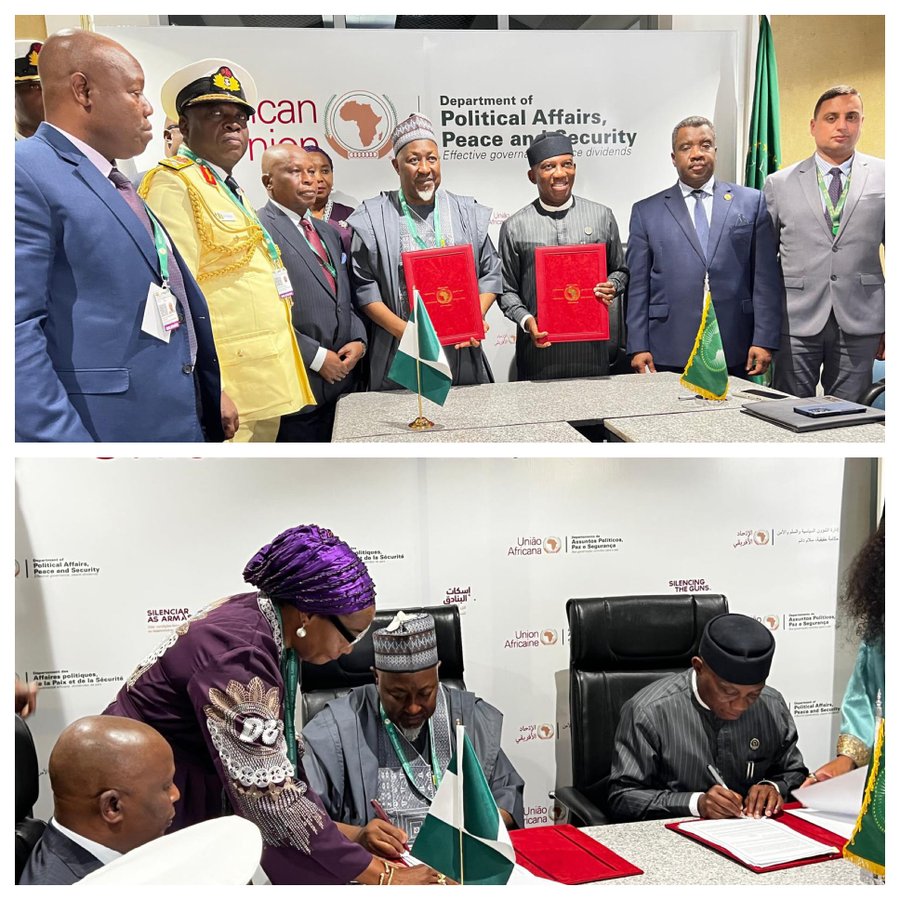At the 38th Ordinary Session of the African Union (AU) Heads of State and Government, President Bola Tinubu urged the AU Peace and Security Council (AUPSC) to prioritise the establishment of a Combined Maritime Task Force to strengthen security in the Gulf of Guinea.
Speaking yesterday, President Tinubu, represented by the Minister of Foreign Affairs, Ambassador Yusuf Tuggar, expressed Nigeria’s readiness to host the headquarters of the task force in Lagos.
He emphasised the need for a coordinated regional approach to combat security threats in Africa’s maritime domain.
“The time has come for the African Union Peace and Security Council to prioritize the creation of a Combined Maritime Task Force for the Gulf of Guinea. I wish to announce that Nigeria would like to host the headquarters of the task force in Lagos,” Tinubu stated.
His call for a maritime task force coincided with the country’s signing of an agreement with the AU to provide Strategic Sea Lift Services for AU peace support operations, humanitarian efforts, and disaster response.
READ ALSO: Nigeria opposes AU departmental split, supports reform efforts
The agreement, signed by Nigeria’s Minister of Defence, Badaru Abubakar, mandates the Nigerian Navy to deploy a vessel for these operations on a cost-recovery basis.
The signing ceremony was attended by Nigeria’s Attorney-General and Minister of Justice, Prince Lateef Fagbemi; Minister of Foreign Affairs, Ambassador Yusuf Tuggar; Chief of Naval Staff, Vice Admiral Emmanuel Ikechukwu Ogalla; and Director-General of the Nigerian Intelligence Agency, Ambassador Muhammed Muhammed.
Others are Ambassador Bankole Adeoye, AU Commissioner for Political Affairs, Peace, and Security, signed on behalf of the AU.
President Tinubu welcomed the AUPSC’s decision to adopt the outcomes of a high-level meeting, including upgrading Nigeria’s National Counter-Terrorism Centre to a Regional Counter-Terrorism Centre.
He also commended the renewal of the mandate of the Multinational Joint Task Force, which continues to combat terrorism and violent extremism in the Lake Chad region.
Addressing security challenges in North Africa, President Tinubu expressed concern over Libya’s instability, noting its adverse effects on the Sahel region.
He called on AU leaders to support initiatives aimed at restoring stability in Libya, warning that, “The Sahel cannot enjoy peace as long as Libya does not.”
He also highlighted the growing security threats faced by Sudan, Burkina Faso, Mali, Niger, South Sudan, and Gabon, emphasising the need for AU-backed measures to support democratic transitions in these nations.
READ ALSO: Tinubu, Buhari, Obi mourn Adebanjo
“It would not be out of place to explore the possibility of extending the inherent benefits of UN Security Council Resolution 2719 to support AU Peace Support Operations,” he added.
He cautioned against the increasing involvement of extra-continental forces and private military companies in Africa’s security affairs.
President Tinubu reaffirmed Nigeria’s support for the African Standby Force and urged AU member states to adopt the draft Memorandum of Understanding for its operationalization.
President Tinubu backed the creation of an African-led Credit Rating Agency (ACRA), arguing that it would ensure fairer assessments of African economies compared to existing global rating agencies.
“An independent African-led rating agency will help provide fairer assessments of African economies and reduce the bias often observed in existing global rating agencies,” he stated.
He lauded the African Union, the African Development Bank (AfDB), and the Specialized Technical Committee (STC) on Finance for their leadership in establishing an African framework for financing development.
He emphasised the importance of the Africa Financing Stability Mechanism (AFSM) in tackling rising borrowing costs, debt burdens, and limited access to long-term affordable financing.
“The establishment of the AFSM underscores the collective commitment of member states to addressing financial vulnerabilities and fostering economic resilience across the continent,” President Tinubu noted.
He referenced the significant progress made at the 5th Extraordinary Session of the Specialized Technical Committee on Finance in Abuja in November 2025, where key decisions on the AFSM were reached.
“The adoption of the AFSM by member states is expected to enhance financial stability, strengthen resilience against external shocks, and provide a more coordinated approach to managing financial risks across the continent,” he concluded.
The AU Summit continues as African leaders deliberate on strategies to address the continent’s security and economic challenges.



